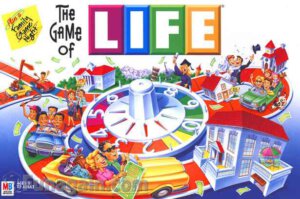Every month I send out a call to a small group of people to remind them that Owl House Game Day is coming up. I’m thinking about this issue now because the call should go out in the next few days. I’m also thinking about it because Jeff posted a piece about gaming pet peeves, and a lot of the peeves are about behaviors during game days. Usually, pieces like mine here tend to focus on what Jeff culled from BGG: the bad behavior of other gamers (or people resisting playing games) and how to deal with that behavior when it arises. You can find a lot of that kind of material over on the ‘Geek, though you might have to dig for it. What I’d like to do is write about how to develop an invitation list.
I know that the temptation is to host a gala, a fabulous event centered on your hobby that will seduce doubters, haters, cheerleaders, and longshoremen. At least, that’s my fantasy. Without the longshoremen, maybe. Unless they bring Kaivai or Flowerpower. Nevertheless, the temptation to invite friends, relatives, co-workers over to your home—be it ever so humble or a sprawling mansion—and show them the power of play and the elegance of contemporary rules is strong.
Like many other lone voices traveling in wildernesses, resist temptation.
Start slow. You don’t have to have a brilliant day of gaming delight for your first event. A few friends will suffice. But here’s the key question: which friends?
So now we’re going to back up to the very first step in hosting a game day (after you’ve purchased some games, but since you’re here at The Gaming Gang reading this—and you have a pulse—I’ll take it as read that you have games), and that first step is judging the interest level of the people around you. In the awkward space I call my head, I have a continuum of gamers which I’ll parcel out in a convenient set of four. First, “Aren’t games for children?” Second, “I love Cranium and The Game of Life!”

Of course, category one is a bit of an outlier as is category four (and an obvious invitee, unless you deem their social/hygiene skills to be lacking). Mostly, you’ll run into people who fit in the very murky middle ground of two and three, but they’re the group that far outnumbers the others, and you’ll probably need to invite some of them. But which people? I know this suggestion will be difficult, but it’s required: you must talk to them.
When you’re talking to people in those two groups, ask them about their childhood experiences. Did they always only play party games? Did they have a wacky relative who taught them to play Acquire? Were they in the chess club? Did they do a study abroad in Japan and get addicted to Go? Or maybe then went to Germany, but can’t find those games here? I’m throwing a lot of questions out, but what I am suggesting here is that you listen. My own family played a lot of games when I was growing up. We’d receive them as presents, or we’d play with relatives or friends. I played Chess and Backgammon with my parents andbrother, and we had a good time.
There are other considerations, of course. You might want theme days (games by only one designer or company, games with similar mechanisms, games with particular themes, etc.). You’ll want to set up expectations about what to bring, including what kinds of food and drink are acceptable at your table (and you can arrange the space in ways that suggests where cups, bottles, and cans might be comfortably placed), and what sort of child care is or is not available. And you’ll want to set up boundaries. “This is the room with whirling knives; do not go in there.” “Here are all the Bibles I read throughout the day.” “Here’s my copy of the Anarchist Cookbook.” But these are details about which the good Geeks have a lot to say.
Developing a gaming group is an intensely social experience. Take your time. But don’t stress it too much. These other people who play games? They’re your species.
- Titan Comics for February 21st, 2018 - Feb 17, 2018
- The Gardeners and the Panda?: A Review of Takenoko - Jan 25, 2012
- You Made a Time Machine Out of a DeLorean? Back to the Future – The Card Game Reviewed - Jan 8, 2012